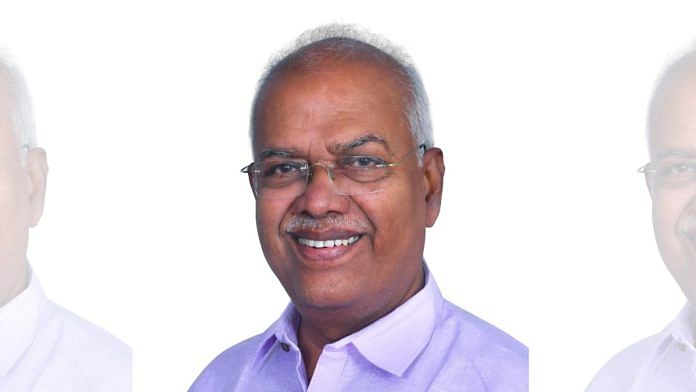According to the state’s industries department, Tamil Nadu accounts for 70-80 percent of the iPhones sourced from India, where only Tamil Nadu and Karnataka manufacture iPhones. TN is also home to Apple’s key vendors Foxconn, Pegatron, and Tata Electronics, while Karnataka hosts Wistron.
According to Jeyaranajan, Tamil Nadu is on its way to becoming a $5 trillion economy by 2047.
“The Tamil Nadu chief minister asked us to work out where we will be by 2047 before going to the NITI Aayog meeting. I expected the economy to be around $4 trillion, but when we ran the numbers—assuming the same growth rate, inflation, and dollar value—you’ll be surprised to learn that Tamil Nadu is set to become a $5 trillion economy by 2047, the 100th year of independence,” Jeyaranjan said, adding that this was a reasonable projection.
When asked about the HCL-Foxconn semiconductor joint venture setting up its wafers manufacturing plant in Uttar Pradesh, which was originally planned to be set up in Tamil Nadu, Jeyarajan said that the state was facing challenges in terms of allocating space for industries.
However, he added that despite the constraints, companies are coming in a big way to Tamil Nadu.
“Whoever has already come here is staying here, and new companies are also coming here. For instance, Global Capability Centres were not there in the city and we made conscious efforts to bring them here, and today, we are second in terms of hiring spaces for work to establish GCCs. The size of export was hardly around a billion USD in 2021 and today it has crossed 15 billion USD,” Jeyaranjan said.
After DMK came to power in 2021, Tamil Nadu Chief Minister M.K. Stalin announced that he would make Tamil Nadu a trillion USD economy by 2030.
When asked about Tamil Nadu’s current progress toward the $1 trillion target, Jeyarajan said the state is on track to achieve it, though recent projections suggest it may be delayed by a year.
Stating that Tamil Nadu is one of the fastest growing economies in the country, he said, “One trillion USD economy is not a fancy number, but a consciously set target with respect to the growth of the state. In fact, our aim is to triple the state’s GSDP,” Jeyarajan said.
He also explained to ThePrint how Tamil Nadu will achieve the $1 trillion target by 2030 and $5 trillion by 2047.
“Unlike other states, the growth process in Tamil Nadu is not driven by current economic policies alone. The growth is conditioned and guided by the social change we have brought in the past 100 years or so. By democratising education, we have empowered people from various communities across various sections of the society. Once you start growing, you cannot derail it or stop it,” he said.
Jeyaranjan said that the long-term efforts of the state government over the years have now started to pay “dividends”.
“If you look at our Gross Enrolment Ratio, India stands at around 26-27 percent, while Tamil Nadu is at 50-51 percent. This is because the state has successfully extended education to all sections of society,” he said.
He also explained that the state government’s policies empowering women has paid off in the long run, which can be seen in college enrolment and employment numbers.
“The state government provides an incentive of Rs 1,000 per month to girls who studied in government schools and pursued higher education. As a result, girl enrollment increased by 30% last year. As a continuation, in Tamil Nadu Public Service Commission, the state has 30 percent reservation for women. Now the number of women getting into TNPSC is more,” Jeyaranjan said, adding that the number of women in TNPSC has surpassed 30 percent.
The state government has also been implementing a slew of other schemes to empower women, including Rs 1,000 in monthly financial assistance and free bus travel for women.
He also gave an example of how the government has allocated funds to administer HPV vaccines to all girl children.
“It will prevent so many cases of cervical cancer. You will reap the benefits only after 30 years. That is the kind of investments we make,” he said.
Although Tamil Nadu is considered a major contributor to software exports, it still has fewer IT companies compared to Bengaluru in Karnataka and Hyderabad in Telangana.
On the limited opportunities in the IT sector, despite establishing the state’s first IT park in 1996, Jeyarajan said that Tamil Nadu has been facing certain challenges in attracting more IT companies.
“When the IT revolution came, during the first 5 years, we slept. When the first IT park was built in 1996, we had already lost 5 years. By that time, Bangalore was ahead and it already had the advantage of having Bharat Electronics and the Indian Institute of Science. Most of the founders of IT companies were from Bengaluru. Since it was a containment town, it had a cosmopolitan culture compared to us. Their lifestyle was different, but here we were more conservative,” he explained.
When it comes to Hyderabad, he said that the amount of land available in the state’s headquarters was a point of attraction for IT firms.
Jeyaranjan also pointed to the lack of evening and night life in Chennai as one of the reasons for fewer IT companies in the state compared to other southern states.
Nevertheless, he said that there are plans to improve the evening and night life in Chennai and policies to that effect will be announced soon.
(Edited by Zinnia Ray Chaudhuri)







